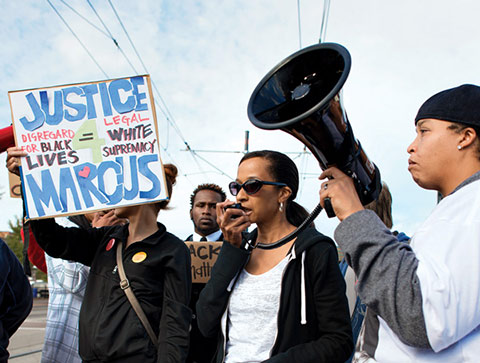Like many Canadians, Akwasi Owusu-Bempah, a sociology professor at U of T Mississauga who studies policing, has been following the spate of police shootings of unarmed citizens, mostly south of the border. U of T Magazine editor Scott Anderson recently spoke with Owusu-Bempah about these incidents and how relations between police and racialized communities in the U.S. and Canada could be improved.
What strikes you when you hear the reports of unarmed African-Americans being shot by police and the social unrest that follows?
The unrest in places such as Ferguson and Baltimore is partly in response to police violence, but it also reflects the frustrations that many African-Americans feel over the failed promise of the civil rights movement. Martin Luther King Jr’s dream of equality is still just a dream for many black Americans. Police violence often acts as a spark for social unrest. But there are a lot of underlying issues that motivate people to get out into the streets and protest.
How does policing in Canada differ from the U.S. with respect to people of colour?
I prefer to look at the differences between racial groups within each country. What we see in Canada is that, compared to whites, black and Aboriginal people are more likely to be victims of police violence. Blacks in Canada may fare better than blacks in the United States but they don’t fare better than whites here.
You’ve said that Canadians have some “blind spots” when it comes to race and policing. What are you referring to?
For one, we don’t have readily available policing data disaggregated by race. While the police gather race-based data in their investigations, it’s not made public, as it is in the U.K. and the United States. As a result, we either think we don’t have a problem or we look to other places, such as the U.S., to see how we’re doing. Let’s also not forget that Canada has done a good job of erasing its racist history. The apartheid government of South Africa borrowed from Canada’s reservation system. We had slavery. We had segregated schools until almost the end of the last century.
What steps do you think we could take to improve relations between police and racialized communities?
First, I think we need race-based data so we can have an intelligible discussion. The police often criticize communities for telling anecdotal stories that don’t reflect reality. And likewise citizens often distrust what police say because we don’t have the data.
Second, the police should acknowledge that there are policing practices that discriminate against certain groups. Carding – the practice of stopping, searching and documenting individuals – is one of these. The way we police drug crimes and give or deny bail are others. In Canada, we’ve seen a doubling down on denial that racism exists in policing. Racism exists across society. We know that.
It’s important to acknowledge that these aren’t just policing problems. These are societal problems. In communities where there are high concentrations of poverty and low levels of education attainment and employment, there are a whole host of problems that police get left to deal with.
Views on crime prevention range widely, from a law and order approach to a focus on poverty and social programs …
I think there has to be a balance. We know some intelligence-led policing strategies are very effective. If there’s a street corner that has a high level of drug dealing you focus your efforts there. That’s a no-brainer. But simply stopping and searching people is not intelligent policing.
Tensions between racialized communities and police are high, which no doubt affects future interactions. How do you reduce that tension?
It’s important to note that the police are state employees and are supposed to uphold the professional standards of the institutions they work for. The onus is on them to play the positive role in an interaction, irrespective of how they’re being treated. Over time, if the police treat people fairly, they’re more likely to get a positive response from citizens.
Scot Wortley and Akwasi Owusu-Bempah give a talk on race and crime at TEDxUofT
Recent Posts
U of T’s 197th Birthday Quiz
Test your knowledge of all things U of T in honour of the university’s 197th anniversary on March 15!
Are Cold Plunges Good for You?
Research suggests they are, in three ways
Work Has Changed. So Have the Qualities of Good Leadership
Rapid shifts in everything from technology to employee expectations are pressuring leaders to constantly adapt






